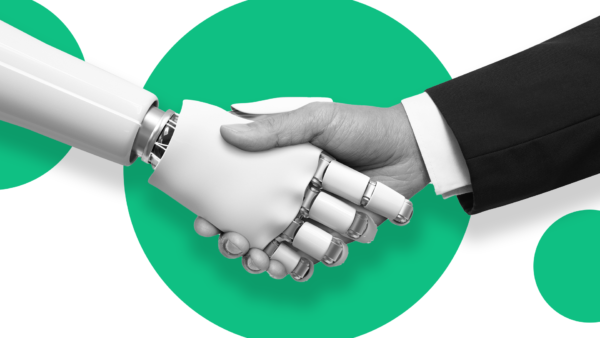The work landscape in Malaysia is evolving, driven by technological advancements, shifting workplace cultures, changing demographics, and economic strategies. These shifts are further amplified by the impact of AI, the recent pandemic, and the evolving expectations of the workforce. Is the rise of AI a threat to your job or a gateway to better work-life balance?
We conducted a survey in March 2024, including over 500 respondents, to better understand the Malaysian workplace. The survey aimed to learn more about the Malaysian population’s preferences, talent expectations, and perceptions regarding job security, work-life balance, the impact of artificial intelligence and automation, and preferred working arrangements.
Key Takeaways
- Emphasis on Work-Life Balance: Malaysian workers highly value work-life balance, influencing their preference for flexible work arrangements that blend remote and on-site opportunities.
- Job Security Concerns: Concerns about job security and career advancement are prominent, with additional worries about AI and automation impacting employment stability in Malaysia.
- Navigating AI and Remote Work: Despite an interest in adopting AI, Malaysian employees face challenges with remote work, such as potential overwork and isolation, highlighting the need for balanced and culturally adapted work policies.
Work Arrangement Preferences
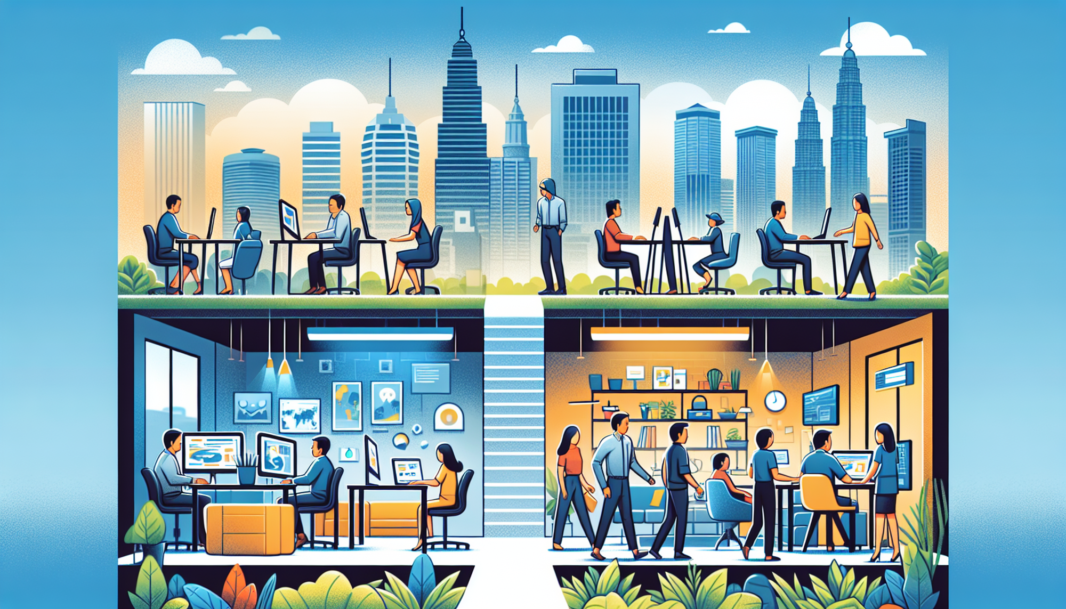
The mix of Eastern and Western influences in Malaysia shapes a unique work culture. Workers here value a balanced work and personal life and aim to keep a peaceful and respectful work environment.
Reflecting these cultural values, our survey found that over 55% of people in Malaysia prefer a hybrid work model, which combines the flexibility of remote work with the structure of on-site tasks. This model is gaining traction as it supports a balanced work-life routine lifestyle and recognizes individuals’ diverse needs and ambitions. The hybrid model is not merely a trend but is becoming the new norm in Malaysia, promoting job satisfaction and a healthier work-life balance.
Interestingly, while the hybrid model leads in preference, 19.9% of respondents still favor a fully on-site work arrangement, highlighting the ongoing value of traditional workplace settings. Conversely, being fully remote or partially remote is less favored, with only 1.8% and 5.7% of the vote.
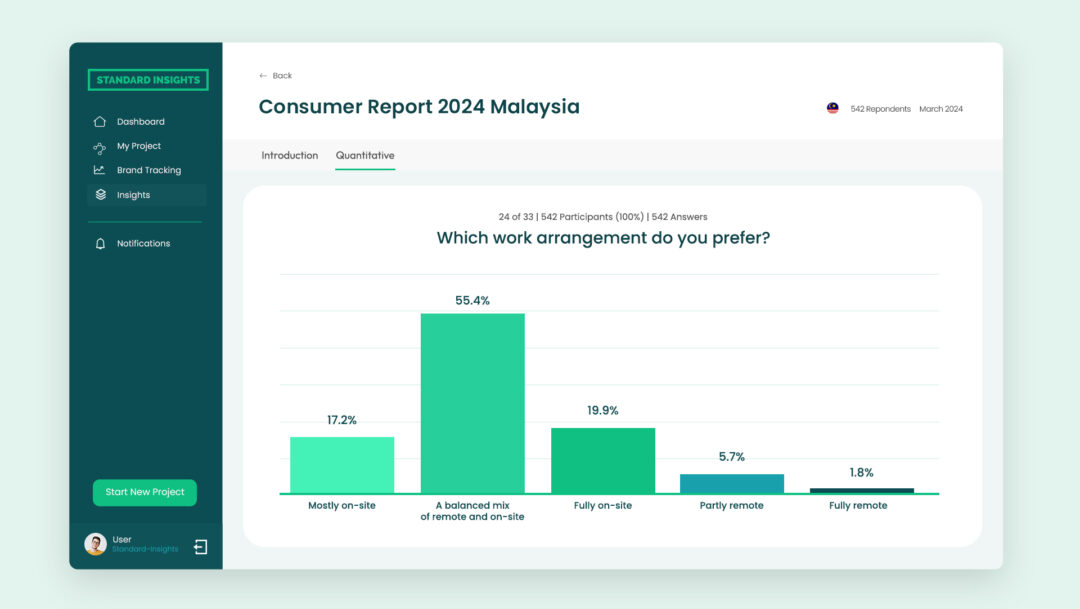
Among Malaysian workers, work-life balance is the top priority for job satisfaction, with 60.3% citing it as crucial. Following closely behind is job security at 58.1%, opportunities for advancement at 53.1%, and a competitive salary at 49.4%. Flexible working hours and locations rank as the fifth most important factor, with 45.4% of respondents highlighting its significance. This statistic shows the growing demand for flexibility in the professional environment, reflecting a broader global trend where employees prioritize a balance between work and personal life.
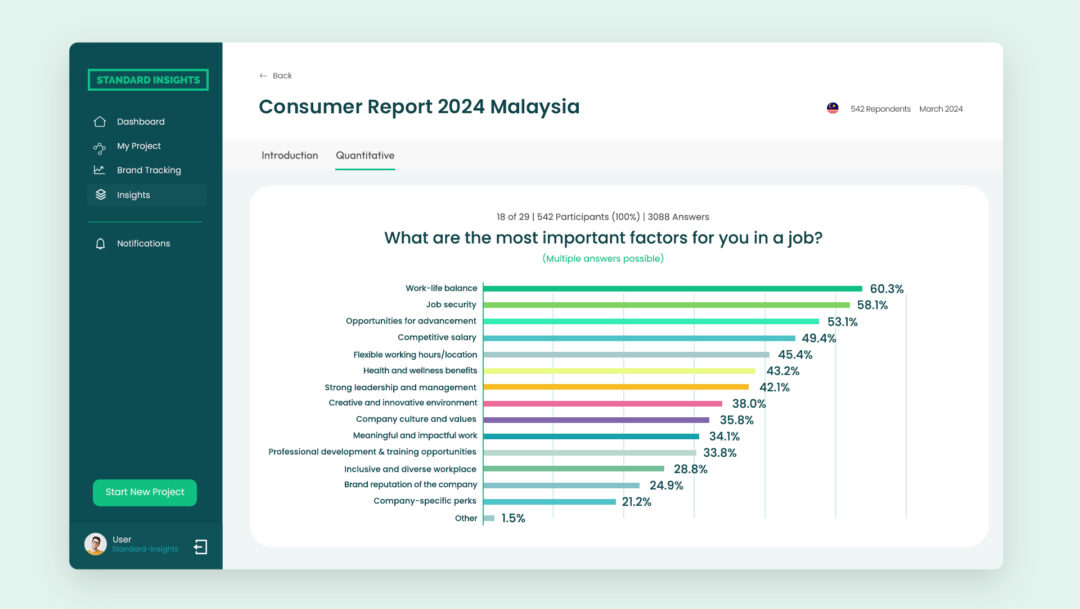
Concerns with Remote Working
Remote work, while offering numerous benefits, also brings several challenges:
- Work-Life Imbalance: About 16.5% of respondents are concerned about the potential for overworking and the blurring of boundaries between work and personal life.
- Isolation: Another significant concern is social isolation, which 15.5% of respondents fear could lead to loneliness.
- Adaptability: Despite these concerns, 15.2% of respondents feel they adapt well to remote working environments, indicating resilience and acceptance among a significant portion of the workforce.
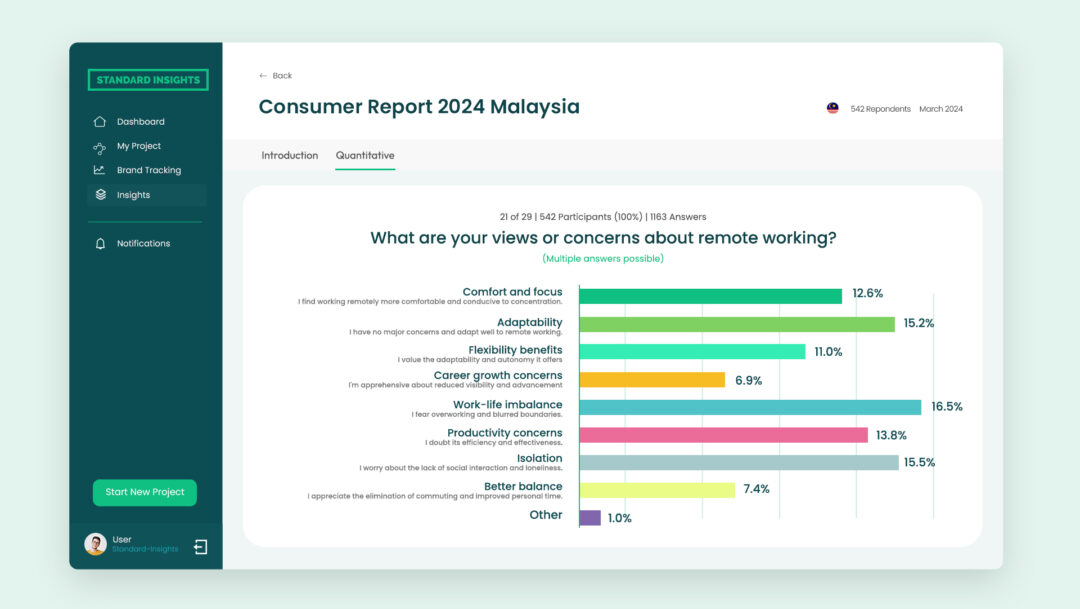
Addressing the Concerns
Malaysian organizations proactively address these concerns by implementing feedback mechanisms to gauge employee sentiments and devising strategies to enhance engagement. This ongoing effort aims to balance the benefits and challenges of remote work, ensuring that employees remain productive and satisfied.
As we continue to explore the evolving work landscape in Malaysia, it is clear that flexible work arrangements are shaping the future. The next sections of our article will delve deeper into how these changes impact work-life balance and employee well-being.
Work-Life Balance in Malaysia
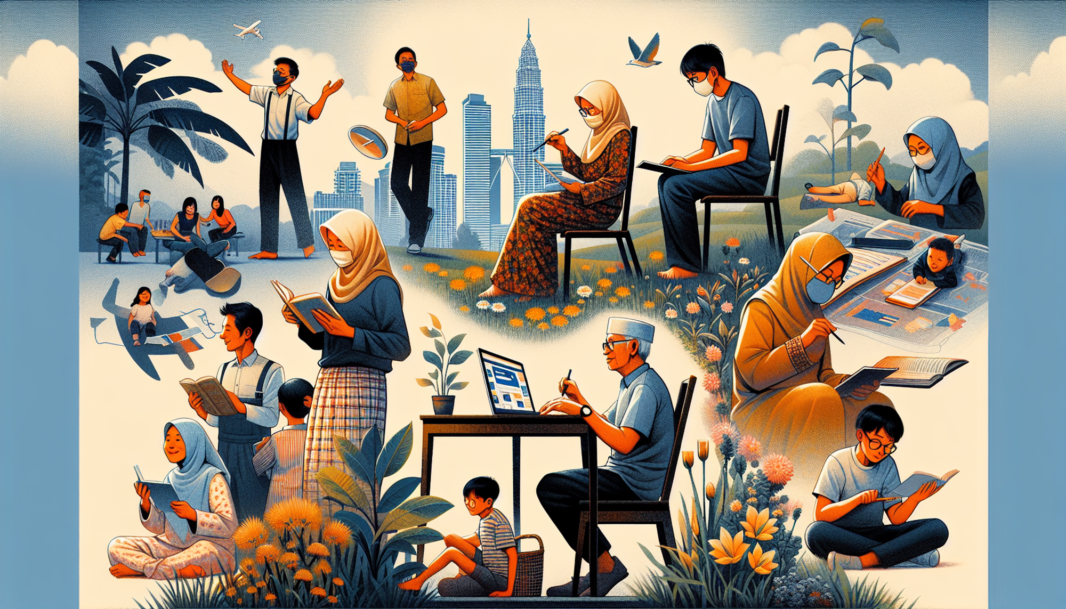
In Malaysia, work-life balance has emerged as a crucial factor for job satisfaction, especially after the pandemic. A significant 42.3% of Malaysians rate it as their top priority, with over 31.4% acknowledging its importance to their overall well-being.
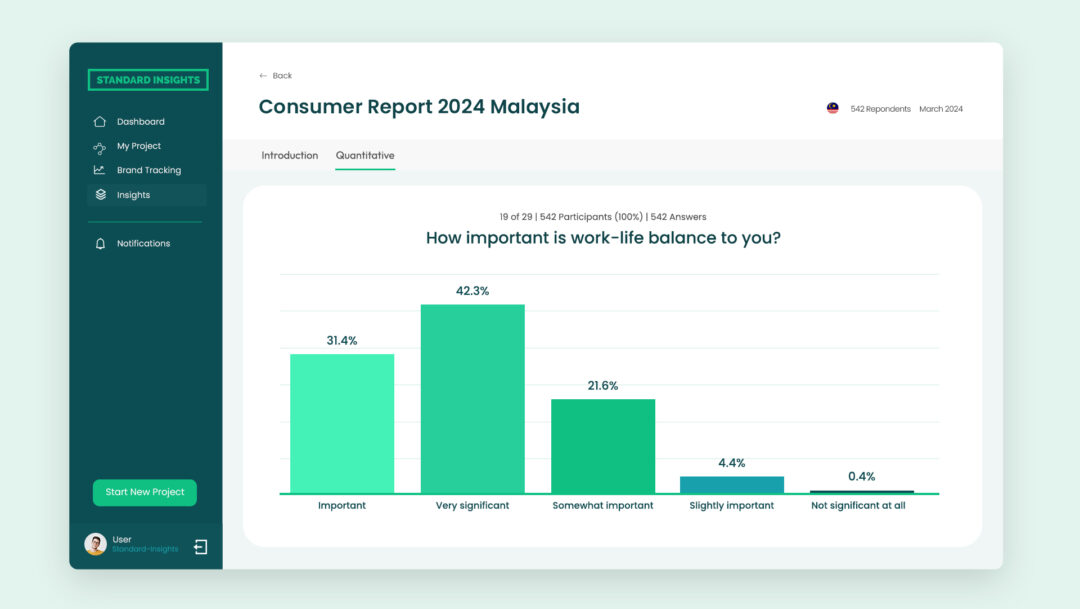
The pandemic shifted priorities, increasing demand for jobs that allow for both professional growth and personal time. As a result, there’s a noticeable shift towards more autonomous and flexible work arrangements.
However, many companies contemplate returning to pre-pandemic work arrangements, which could conflict with current employee expectations. The workforce has adapted to flexible working conditions and might resist rigid schedules.
Businesses that embrace adaptable work models that prioritize employee well-being are likely to see enhanced productivity and impact job satisfaction. Moving forward, maintaining a balance between work demands and personal life remains a key focus for employers and employees in Malaysia.
Employee Engagement and Non-monetary Benefits
The emphasis on non-monetary benefits, such as work-life balance and job security, resonates with the values of the Malaysian work culture. In a culture that prioritizes harmony and stability, employees seek workplaces that offer a supportive environment and opportunities for growth
Competitive salaries are important, yet they represent just one facet of job satisfaction. Increasingly, employees value intangible benefits such as flexible work conditions, career growth opportunities, and engaging job responsibilities. These factors highlight the growing importance of providing more than direct financial compensation to boost job satisfaction and retain talent.
Interestingly, competitive salary ranks only fourth in importance for job seekers. Non-monetary rewards like work-life balance, job security, and opportunities for professional growth are pivotal in motivating and retaining employees.
While all factors contribute to job satisfaction, company-specific perks, the company’s brand reputation, and an inclusive and diverse workplace rank lower in priority for most individuals.
As work practices evolve to meet changing employee expectations, organizations face the challenge of actively listening and adapting to the desires for flexibility, autonomy, and opportunities to pursue individual interests. This adaptability is essential for cultivating a supportive and productive workplace environment.
Automation and AI in the Workplace
With the advent of AI and automation, certain job sectors in Malaysia are at risk of displacement. This raises concerns about job security, especially for potentially automated roles.
Public Perception and Response to AI
Our surveys indicate a complex sentiment towards AI and automation. Approximately 31.5% of Malaysians fear being replaced by AI, while 21% recognize its potential to enhance productivity. Additionally, 20.7% expressed concerns over their skills becoming obsolete due to rapid technological advancements.
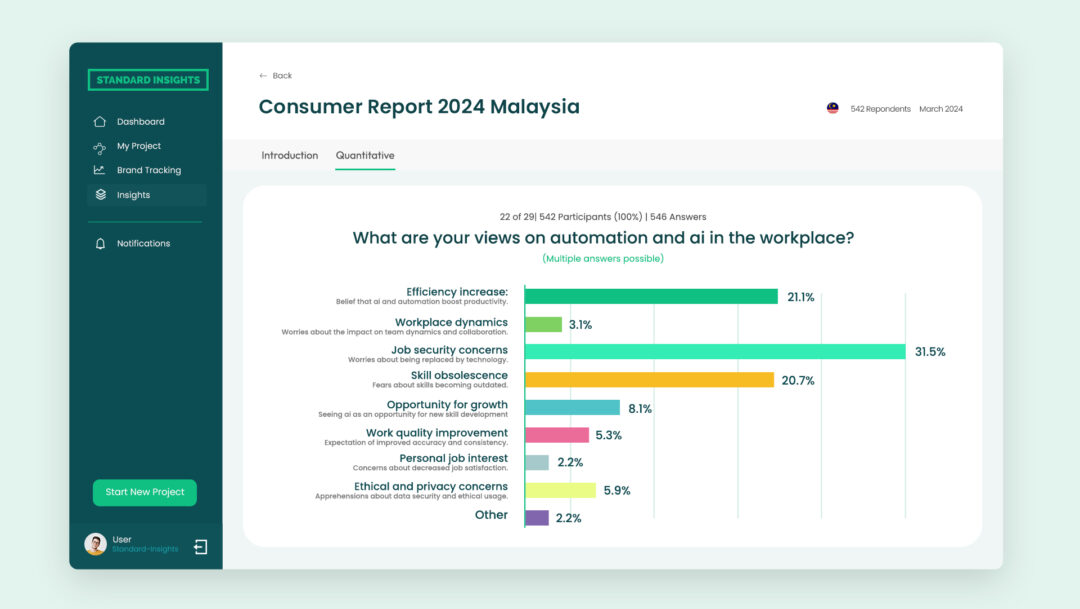
Despite these fears, a broader perspective reveals that 47.6% of Malaysians are uncertain about their job’s future in the AI era, yet only 18% believe their roles are at immediate risk or will be replaced. This indicates a higher general job security sentiment when the context of AI is removed, though neutrality and uncertainty still prevail.
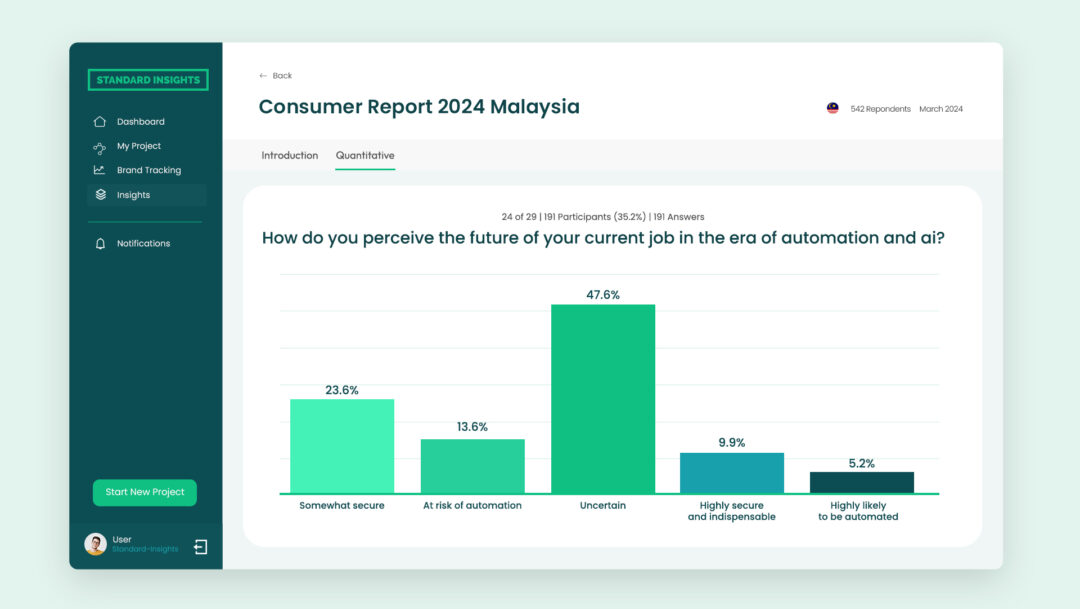
Malaysia’s AI Strategy: The National AI Roadmap
In response to these challenges and to fully capitalize on the opportunities presented by AI, the Malaysian government, spearheaded by the Ministry of Science, Technology, and Innovation (MOSTI), has developed a comprehensive strategy known as the Malaysia AI Roadmap. This initiative outlines a robust framework to foster AI-driven economic growth by enhancing AI governance, research, digital infrastructure, and talent development. It focuses on making AI a key component in boosting productivity and competitive advantage across various sectors, ensuring that the workforce is prepared and resilient in the face of technological changes.
Governmental and private organizations are implementing protective and proactive initiatives. These include workforce training programs for technological adaptation and social protection for transitioning workers. There is a crucial need for skills that complement AI, such as AI development, ethical AI governance, and strategic consulting. Surveys indicate that about 12.7% of the workforce currently does not use AI, but 17.7% plan to adopt it soon, primarily for tasks like data analysis and reporting.
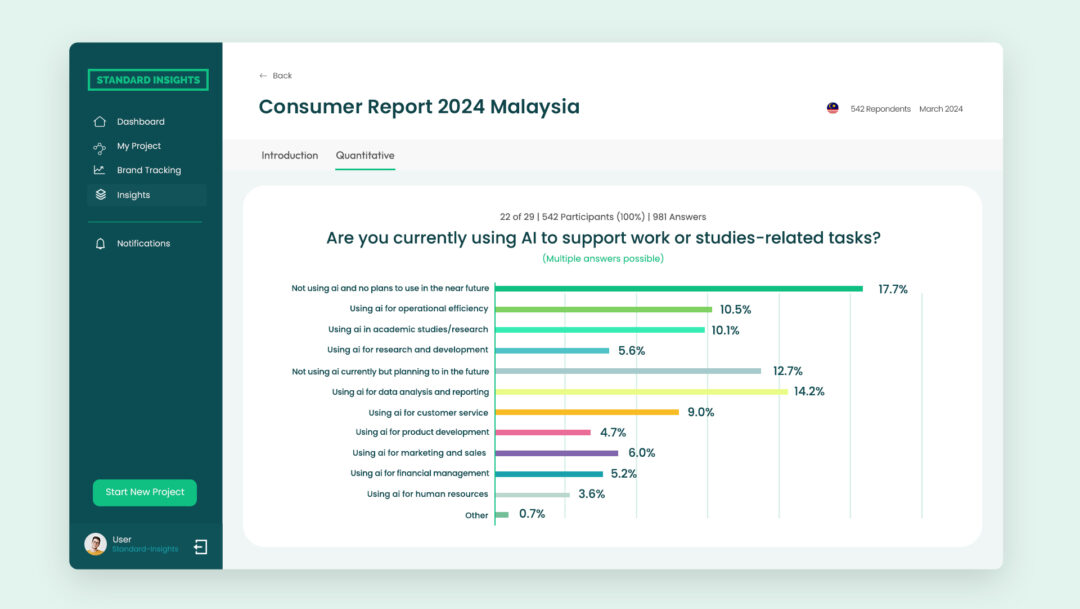
Conclusion
The future of work in Malaysia is undergoing a significant transformation, driven by technological advancements, shifting priorities, and evolving employee expectations. Our survey findings highlight the importance of work-life balance, the challenges of remote work, and the impact of automation and AI on job security. To navigate these changes, employers must adapt to the shifting expectations of their employees, prioritizing:
- Flexibility: Offering hybrid and flexible work arrangements that cater to individual needs and preferences.
- Growth Opportunities: Providing employees with opportunities for professional development and career advancement.
- Employee Well-being: Implementing strategies that support mental health, work-life balance, and overall job satisfaction.
The Malaysian government and private sector are taking proactive measures to foster AI-driven growth while ensuring workforce preparedness and resilience. Understanding and addressing the workforce’s key concerns, preferences, and aspirations will be crucial in shaping a more fulfilling future of work for all Malaysians.
For customized insights into Malaysian consumers, please consult our Market Research services in Malaysia. You can also access the full study for free, which is featured in our Consumer Report Malaysia 2024.
Frequently Asked Questions
What is the preferred work model among Malaysian employees?
Malaysian employees prefer a hybrid work model that combines remote and on-site work elements. Over 55% of people favor this approach.
How significant is work-life balance to Malaysian employees?
Work-life balance ranks as a top job priority for 60.3% of Malaysian employees. Additionally, 73.7% view it as important or very important.
Are Malaysian employees worried about job security due to automation and AI?
Yes, a significant portion of Malaysian employees, about 31.5%, are worried about job security due to automation and AI in the workplace. This indicates a notable level of concern among the workforce.
What measures are being taken to safeguard employment in Malaysia?
The government and organizations are implementing various initiatives, such as training, funding, and social protection measures, to safeguard employment in Malaysia.


